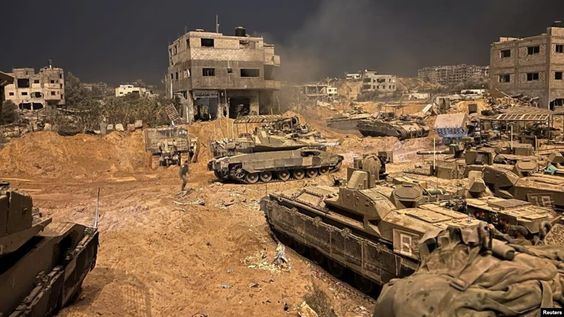Headlines
Gaza’s Phone and Internet Services Are Down Again

Paltel (Palestine Telecommunication Company), the enclave’s telecom provider, announced a total outage of all phone and Internet services to its citizens late on Tuesday via X, the social networking platform that was once known as Twitter. The interruption was “caused by international routes that were previously reconnected being cut off again,” according to the business.
Beginning last Friday, Gaza had a complete communications blackout that lasted for two days, cutting off the world from the 2.3 million people living there and delaying the delivery of vital humanitarian aid from abroad.
Hours after an Israeli bombardment on a Palestinian refugee camp in the northern Gaza city of Jabaliya resulted in at least 50 fatalities and 150 injuries, according to Palestinian health authorities, there was the most recent outage of phone and Internet connection.
“A very senior Hamas commander” was in the vicinity, an Israeli army spokesman told CNN after confirming the airstrike. The guy was eventually identified as Ibrahim Biari by the Israel Defence Forces, who declared in a statement that he was the mastermind of the “murderous terror attack” that Hamas militants carried out in southern Israel on October 7.
Families of war refugees from as far back as 1948 lived in Jabaliya, according to Reuters. According to a Hamas statement, 400 people were killed or injured, and no commanders were present at the camp. According to Reuters, the numbers could not be independently verified.
Israel charges Hamas, which the United States and other countries have branded as a terrorist organisation, of utilising people as human shields and of having an extensive network of tunnels beneath Gaza where it is allegedly storing food, fuel, and other supplies.
Several of Israel’s Arab neighbours were incensed by the airstrike on the Jabaliya refugee camp. The incident will have “irreparable ramifications in the region,” according to a statement released by the foreign ministry of the United Arab Emirates. “An immediate ceasefire to prevent further loss of life,” the monarchy demanded once more.
In a tweet on the messaging app Telegram, a spokesman for Iran’s foreign ministry said that Israel had once again committed a war crime, while Saudi Arabia denounced the incident as “inhumane targeting by the Israeli occupation forces.”
The Israeli military has been attacking Hamas and its vast tunnel network in Gaza with air and ground attacks, the most recent of which was launched on Tuesday on Jabaliya. Earlier on Tuesday, the IDF reported that another Hamas commander responsible for the Oct. 7 terror attack that claimed 1,400 lives was killed in an airstrike.
According to the Israeli Defence Forces and Shin Bet, the country’s internal security agency, Nasim Abu Ajina led the Beit Lahia Battalion of Hamas’ Northern Brigade and contributed to the creation of the unmanned aerial vehicles and paragliders used in the blatant invasion.
READ ALSO: Bolivia severs relations with Israel due to the Gaza War
Since the beginning of the conflict, the IDF has “struck over 11,000 targets belonging to terrorist organisations in the Gaza Strip,” or more than 440 times a day on average, according to a statement released on Wednesday.
No Sign of Relief for the Humanitarian Crisis
The congested Palestinian enclave is experiencing a humanitarian crisis as a result of Israeli attacks.
According to numbers released by the Palestinian Health Ministry, which is administered by Hamas, 216 Palestinians were murdered in Gaza between Monday and Tuesday, according to the United Nations humanitarian agency (OCHA). There have been almost 8,500 deaths overall, with women and children accounting for 67% of the total.
According to the agency, 59 more trucks filled with food, water, and medication arrived in Gaza on Tuesday via the Rafah crossing with Egypt. This is the biggest humanitarian relief convoy since October 21 and brings the total number of trucks in Gaza to 217. However, it states that the essential fuel sources required to run life-saving equipment are still prohibited.
U.N. Secretary-General Antonio Guterres reiterated his call for a humanitarian truce on Tuesday, saying, “The level of humanitarian assistance that has been allowed into Gaza up to this point is completely inadequate and not commensurate with the needs of people in Gaza, compounding the humanitarian tragedy.”
As of Tuesday, over 1.4 million Palestinians in Gaza were internally displaced, according to OCHA, with over 689,000 of them finding shelter in institutions managed by the Palestinian refugee agency of the United Nations.
According to an Egyptian border officer quoted by CNN on Wednesday, some 80 ambulances arrived at the Rafah border crossing to collect injured Palestinian patients.
The patients will be the first Palestinians who have been known to be permitted to leave Gaza since the conflict began three weeks ago.
The U.S.-based news network was informed by an Egyptian border official that the crossing was ready to take 81 injured Palestinians from Gaza for medical attention at Egyptian hospitals.
News sources report that on Wednesday, foreign nationals and dual citizens who had been stuck in Gaza started to enter Egypt via the Rafah border crossing.
Blinken Will Go Back to the Area on Friday
According to a brief statement from spokesman Matthew Miller, U.S. Secretary of State Antony Blinken will visit Israel on Friday for discussions with representatives of the Israeli government and to “make other stops in the region.”
Miller added that Blinken and Israeli President Isaac Herzog had a phone conversation on Tuesday. Israel’s right to self-defense against terrorism is supported by the United States, he added, and Blinken “emphasised the need to take feasible precautions to minimise harm to civilians” and “consistent with international humanitarian law.”
Along with their commitment to stop the conflict from getting worse, Blinken and Herzog promised to work nonstop to release the 240 hostages that Hamas is holding, speed up the “pace and volume of humanitarian assistance” for Palestinian residents in Gaza.
The Associated Press, Reuters, and Agence France Presse provided some of the information for this article.
